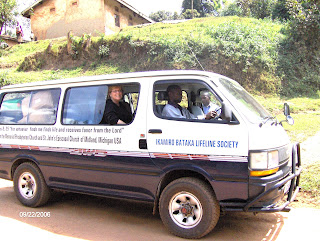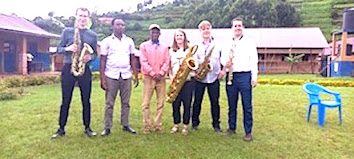ACT's Sustainable Future
How can we make ACT more self-sustainable? That was the question that led the ACT US Board to charter the FUNDS (Financial Ugandan Needs for Development & Sustainability) Task Force in early 2020 to research and propose new models of sustainability for ACT, for both programs in Uganda and ACT US. FUNDS Task Force members include (from Muko, Uganda) Alexander "Guma" Gumoshabe, Generous Turinawe, Onesmas Arinda, Ken Blickenstaff (Indianapolis), and from Midland: Bill Busch, Kelly Busse, Gail Hoffman, Mark Maxwell, Roger Moll, Dave Molzahn, Lynn Pottenger and Sue Waechter (Traverse City).
The Task Force brainstormed possible social businesses that could be run in Uganda to provide ongoing revenue to support the ACT Uganda programs. There are many business models for a social business (also known as venture philanthropy), but generally it is a non-dividend company dedicated to solving human problems. In our case, the goal would be to raise money for ACT programs, with secondary goals being to provide employment in the community and to favorably impact (or at least not unfavorably impact) the environment. (the model comes from a book entitled, A World of Three Zeros, by Mohammad Yunus). Philanthropists provide capital to help get social businesses started. This capital could either be considered a donation, or could be considered a loan which would be paid back without or with minimal interest.
After brainstorming with strongest consideration of the ideas from our Ugandan staff, a prioritization algorithm was used to determine the top social business candidates, which were Transportation (providing cargo and passenger transportation for the community), a Stationery/Print Shop (providing office supplies and services to the community, and Tailoring (providing school uniforms and other clothing to the community. These business models were run through feasibility studies to help predict whether they would be successful (make money to support ACT programs). The feasibility studies suggested that none of these businesses, as defined, was likely to be successful.
August is the last month of our pilot of the Hardware Store. We have seen a minimal profit nearly every month. In his book, Yunus suggests that breaking even is a good goal for the first 6 months!
We will be meeting in the next couple of weeks to evaluate the pilot Hardware Store, make decisions about its future, and potentially discuss other ideas for additional social businesses. This effort might prove to provide our programs in Muko the support they need without having to rely on most funding from the US. This would indeed be a huge "transformation" for our friends in Muko Sub-County and ensure a strong Agape Community Transformation for the next 20 years.






Thank you very much!!
ReplyDeleteThe businesses all seemed viable. And the Hardware Store is proving successful! Thank you for your diligence strategy and now a functioning business.
ReplyDeleteThank you for positively impacting Muko sub county in Uganda. We greatly appreciate works of ACT US 🙏
ReplyDelete